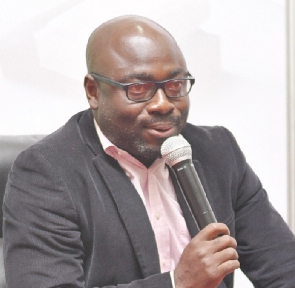 Professor Lord Mensah, Economist
Professor Lord Mensah, Economist
Economist, Professor Lord Mensah, has expressed concern over the management of Ghana’s exchange rate regime over the years. According to him, successive governments have often resorted to managing the exchange rate with loans and bonds secured from the capital markets and donors. Speaking in an interview with Accra-based Joy News, Prof. Lord Mensah opined that Ghana’s exchange rate has not been properly managed. “Our exchange rates have never been managed. We’ve been managing it with loans and clearly everything shows on the grounds. We have sacrificed our export drive policies; we have sacrificed our production which will reduce some importation for just loans in managing our exchange rate," he said. “The reason why we can see the dollar moving without control is our absence on the Eurobond market. For the past few years, it is only this year that the government found it difficult to go on the Eurobond market,” he is quoted by Joy News to have said. He further noted that over-reliance of bonds and loans will continue to impact the economy, especially in the resolve toward becoming an industrialized nation with a sound export regime. “All other loans are coming in; the Cocoa syndicated loans are coming in, we could get loans from Afreximbank and all those but the problem we are having is access to the Eurobond market. And access to the Eurobond market in the sense that most of our debt which are foreign we have to service them using foreign currency,” the economist said. Touching on Ghana’s inability to access capital markets for borrowing, Dr Mensah warned that government may struggle to raise enough dollars to service interest payments, finance domestic projects and support importations. “And the Eurobond anytime we go there, if you look at the prospectus clearly it tells you that we borrow to defray existing debt and then we borrow extra to bring some in-house to grow the economy," he said. "So effectively it has been the case that every year we have access to the Eurobond market to service our interest payments and so therefore the Cocoa syndicated loans and all other loans comes in to give us some buffer to meet the local demand of the dollar," he added. Prof. Mensah explained, “So now that the Eurobond market has been frozen on us it has turned out to be difficult to meet this demand of interest payment and at the same time the local traders and all those transactions that goes on in the environment." MA/ESA
Economist, Professor Lord Mensah, has expressed concern over the management of Ghana’s exchange rate regime over the years. According to him, successive governments have often resorted to managing the exchange rate with loans and bonds secured from the capital markets and donors. Speaking in an interview with Accra-based Joy News, Prof. Lord Mensah opined that Ghana’s exchange rate has not been properly managed. “Our exchange rates have never been managed. We’ve been managing it with loans and clearly everything shows on the grounds. We have sacrificed our export drive policies; we have sacrificed our production which will reduce some importation for just loans in managing our exchange rate," he said. “The reason why we can see the dollar moving without control is our absence on the Eurobond market. For the past few years, it is only this year that the government found it difficult to go on the Eurobond market,” he is quoted by Joy News to have said. He further noted that over-reliance of bonds and loans will continue to impact the economy, especially in the resolve toward becoming an industrialized nation with a sound export regime. “All other loans are coming in; the Cocoa syndicated loans are coming in, we could get loans from Afreximbank and all those but the problem we are having is access to the Eurobond market. And access to the Eurobond market in the sense that most of our debt which are foreign we have to service them using foreign currency,” the economist said. Touching on Ghana’s inability to access capital markets for borrowing, Dr Mensah warned that government may struggle to raise enough dollars to service interest payments, finance domestic projects and support importations. “And the Eurobond anytime we go there, if you look at the prospectus clearly it tells you that we borrow to defray existing debt and then we borrow extra to bring some in-house to grow the economy," he said. "So effectively it has been the case that every year we have access to the Eurobond market to service our interest payments and so therefore the Cocoa syndicated loans and all other loans comes in to give us some buffer to meet the local demand of the dollar," he added. Prof. Mensah explained, “So now that the Eurobond market has been frozen on us it has turned out to be difficult to meet this demand of interest payment and at the same time the local traders and all those transactions that goes on in the environment." MA/ESA